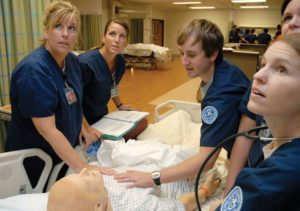What Can I Do With A Medical Degree?

Find your degree
A medical degree will qualify graduates for a wide variety of roles in healthcare depending on their specific degree and specialization. By earning a degree from one of the top medical schools, you will stand out among other candidates in your profession, gain a theoretical understanding of the ideas that are the groundwork for the healthcare industry, and engage in workplace practicum experiences that put your theoretical knowledge to practical use.
There are medical degrees available at all levels of academia. Undergraduate medical degrees are usually called pre-med majors, and are not required, but are highly suggested, for students looking to apply to a graduate-level medical degree program. Some of the most common medical degrees are Master of Medicine (MMed), Master of Surgery (MSurg), and Doctor of Medicine (DM). If you want to look into some of the top medical schools, you could start by checking out some med school rankings.
What Kind of Accreditations Can Medical Degrees Have?

One of the first things you should look for in a medical degree program is that they have been certified by an accreditation council. Accreditation ensures that a medical school provides professors, curriculum, and facilities that meet the standards of the academic and medical community and lets students know that they will receive a high-quality education. All medical schools in the United States should be accredited by one of two organizations:
- The Liaison Committee on Medical Education (LCME): The LCME is an accreditation that is sponsored by the American Medical Association, and the Association of American Medical Colleges. In addition to accrediting medical schools, the LCME publishes guides that set standards for the medical community. The LCME only accredits schools that grant a Doctor of Medicine (MD) degree.
- Commission on Osteopathic College Accreditation (COCA): COCA provides accreditation for medical schools that offer Doctor of Osteopathic Medicine (DOs) degrees in the United States. Osteopathy focuses on physical as opposed to chemical problems and solutions in the medical field.
Students should be aware that while there used to be a large distinction between MD and DOs degrees, the line between the two is consistently thinning. An accreditation like the LCME or COCA will ensure that medical programs graduate capable doctors and physicians that are highly sought after on the job market.
What Types of Degrees are Medical Degrees?
There are many types of degrees that fall under the umbrella of medical degrees. Medical degrees can be earned at all levels of academia, though undergraduate degrees are usually referred to as “pre-med”. If you are looking for a good undergraduate medical education, check out our list of best colleges for pre med. There are many medical degrees offered at the graduate level, types of degrees include:
 Doctor of Medicine (DM): A DM degree is a professional doctorate which is aimed at graduating qualified physicians to practice medicine in a clinical setting.
Doctor of Medicine (DM): A DM degree is a professional doctorate which is aimed at graduating qualified physicians to practice medicine in a clinical setting.
- Doctorate of Medicine and Philosophy (MD-PhD): An MD-PhD is a dual doctoral degree which combines vocational training that is available in DM programs, with research expertise that will give students a theoretical understanding of the theories and ideas that are the basis for medical practice.
- Doctor of Surgery (DS): A DS degree will prepare students to take on the high-pressure role of clinical surgeon, giving them the credentials to operate on various physical ailments of their patients.
- Master of Clinical Medicine (MCM): MCM degree programs are designed to give students the analytic and critical thinking skills that will allow them to find and address problems within the healthcare industry.
- Master of Medicine (MMed): MMed degrees allow medical students to focus on a number of different areas of medical academic study, usually with the intent of pursuing a DM or MD-PhD after graduation. Some disciplines available for MMed students include public health, biomedicine, and nutrition and dietetics.
Graduate-level medical degrees are some of the most difficult degrees available, and require large investments of time and money. Before you apply to a medical degree program you should have an idea of the specific position that you will be applying to after graduation, to ensure that your program is geared to your professional and academic expectations. Contacting an academic advisor at a school where you are applying can give you a better understanding of medical school requirements.
What Are The Best Medical Schools?

The best medical schools will be ones that are accredited by either the LCME or COCA and have high graduation rates and professional job placement. While there are a number of med school rankings to help you get started, the best medical school for you will be the one that matches your professional and academic expectations with personal, financial, and logistic requirements. Before looking at schools you should take stock of what you are looking for in your medical degree so that when you are looking at schools you will have a good idea of which one will be right for you. Based on a methodology that balances student satisfaction, graduation rate, and affordability, schools that rank as top medical schools include:
- Harvard Medical School
- University of Florida College of Medicine
- Dartmouth College Geisel School of Medicine
- Northwestern University Feinberg School of Medicine
For a full list of top medical schools, check out our med school rankings, and if any of the programs pique your interest, be sure to follow the links to their school website to request more information or to speak to a professor or admissions counselor.
Where Can I Find Out How to Get Into Medical School?

Finding and applying to medical schools can be an extremely daunting task, as many of them are highly competitive and require a large investment of time and money. Fortunately, there are many resources available for potential medical students. Some of the most useful resources for students looking to find out how to get into medical school are:
- Online College Plan: Since you are on this page, you are already on the right track. Online College Plan is dedicated to providing students a compendium of resources that will help them navigate the college application process.
- Undergraduate Advisors: One of the prerequisites to med school is to have earned a bachelor’s degree, usually with a major in pre-med. Your undergraduate advisor should be able to help mentor you in your med school application process.
- Practicing Physicians and Doctors: Most people have a primary care physician or other doctors that they have built a relationship with over the years. They can tell you about their own experience, and provide you with information that only a practicing professional would know.
- Schools to Which You Are Applying: If you are looking into applying to a top medical program, you should contact an admissions counselor or professor that you hope to be studying under, as they will let you know the specific medical school requirements of applying to their degree program.
One thing you will have to provide on your application is a medical school personal statement in which you will communicate your personal inspirations for pursuing a degree in medicine. While you are looking at universities, it is a good idea to read their mission statements to see if they will match your medical school personal statement.
What Are the Licensing or Certification Processes?

Physicians and other medical professionals should gain board certification to ensure that they can demonstrate expertise of their particular medical specialty. There are over 20 specific board certifications that are available for professionals to obtain. If you are unsure of the license or certification that adheres to your desired role in the medical community, you should ask your academic advisor. One of the most well regarded medical boards offering certification is the American Board of Medical Specialties (ABMS). The process of gaining an ABMS certification includes:
- Finishing a bachelor’s degree.
- Earn a medical degree from an accredited institution.
- Complete at least three years of experience in a residency training program that is accredited by the Accreditation Council for Graduate Medical Education.
- Provide letters of recommendation from your professors.
- Pass a written examination administered by an ABMS Member Board.
What Can I Do With A Medical Degree?
There are a number of different roles in the medical community, most of which involve maintaining a medical practice. Besides being a doctor or surgeon, there are a number of supporting medical roles that are available for graduates with a medical degree, including:
- Anesthesiologist: Anesthesiologists have specialized knowledge in administering anesthesia to patients who are undergoing surgery. Anesthesiologists literally have patients lives in their hands, so they are well compensated.
 Physician Assistant: Physician Assistants practice medicine on a team with physicians and surgeons, to arrive at a consensus of proper treatment procedures for patients.
Physician Assistant: Physician Assistants practice medicine on a team with physicians and surgeons, to arrive at a consensus of proper treatment procedures for patients.- Veterinarian: Veterinarians provide healthcare for different kinds of animals including livestock and pets.
- Radiologist: Radiologists operate medical image machinery such as X-rays, CT scans, and MRI machines to diagnose patients.
- Pathologist: Pathologists research and study diseases in laboratory settings to devise new treatments and diagnostic procedures.
If you would like to obtain one of these jobs or another position within the medical industry, the first step is to earn a degree from a medical degree program.
What is the Average Salary for Someone with a Medical Degree?
There are a number of different variables that go into calculating your expected pay grade after graduating from medical school. Some variables include:
- Location: Hospitals and clinics that are located in urban centers often pay more than ones in rural or suburban settings, as the cost of living is higher in urban centers.
- Experience: The amount of time you have spent practicing in the medical field will factor into your expected salary.
- Employer: Whether you are working for a large hospital, private clinic, or not for profit medical organization will affect your expected pay grade.
Keeping these variables in mind, consider the following average salaries for various positions in the medical field:
- Physicians and Surgeons: Physicians and surgeons earn an average salary that is greater than or equal to $208,000, there are currently 713,800 physicians and surgeons employed in the United States, with that number expected to increase by 13% over the next decade.
- Dentist: Dentists make an average annual salary of $158,120, and there are currently 153,500 dentists employed in the United States, with that number expected to increase by 19% over the next decade.
 Nurse Anesthetists, Midwives, and Practitioners: Specialized nurses make an average annual salary of $110,930 and there are currently 203,800 specialized nurses employed in the United States, with that number expected to increase by 31% over the next decade.
Nurse Anesthetists, Midwives, and Practitioners: Specialized nurses make an average annual salary of $110,930 and there are currently 203,800 specialized nurses employed in the United States, with that number expected to increase by 31% over the next decade.- Podiatrist: Podiatrists are doctors that provide care for patients with foot, ankle, or lower leg problems. They make an average annual salary of $127,740, and there are currently 11,000 podiatrists employed in the United States, with that number expected to increase by 10% over the next decade.
- Optometrist: Optometrists make an average annual salary of $110,300 per year, and there are currently 40,200 optometrists employed in the United States, with that number expected to increase by 18% over the next decade.
- Physician Assistant: Physician Assistants make an average annual salary of $104,860, and there are currently 106,200 physician assistants employed in the United States, with that number expected to increase by 37% over the next decade.
If any of these professions are your desired job, you should check out some of the top medical schools.
Are There Medical Associations I Should Join?

Medical associations are groups of physicians and other healthcare professionals who collectively work towards improving their particular medical profession and specialty. While it is not required, there are many benefits of joining a medical association, including:
- Education: Having the ability to meet and communicate with other professionals in your field will allow you to stay up to date with new practices and concerns in your field.
- Jobs: Your medical association can inform you of job openings that you are qualified for.
- Networking: There are numerous benefits from keeping in contact with other professionals in your field, as they will give you a practical understanding of the norms and standards of your profession, as well as provide you with support if any problems arise.
- Improve your Medical Field: By pooling the knowledge of different medical professionals, new innovations and procedures can be devised that will improve your specific field.
- Miscellaneous Benefits: Joining a medical association can give you insurance and equipment discounts, as well as other surprising benefits.

While there are many different medical associations, one of the most common is the American Medical Association which has the mission of leading meaningful innovation to enable a better healthcare system for patients and physicians. One of the benefits of attending a top medical school is that your professors can help you find the association that will be most beneficial to you.

 Doctor of Medicine (DM): A DM degree is a
Doctor of Medicine (DM): A DM degree is a  Physician Assistant: Physician Assistants practice medicine on a team with physicians and surgeons, to arrive at a consensus of proper treatment procedures for patients.
Physician Assistant: Physician Assistants practice medicine on a team with physicians and surgeons, to arrive at a consensus of proper treatment procedures for patients. Nurse Anesthetists, Midwives, and Practitioners: Specialized nurses make an average annual salary of $110,930 and there are currently 203,800 specialized nurses employed in the United States, with that number expected to increase by 31% over the next decade.
Nurse Anesthetists, Midwives, and Practitioners: Specialized nurses make an average annual salary of $110,930 and there are currently 203,800 specialized nurses employed in the United States, with that number expected to increase by 31% over the next decade.